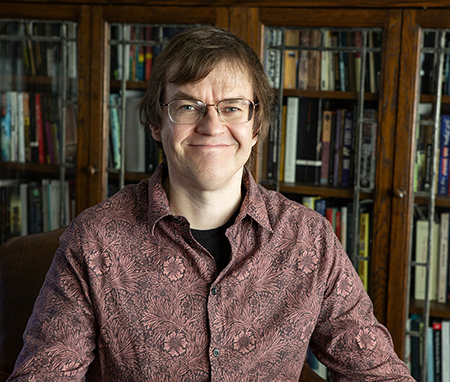CWRU professor named Guggenheim Fellow

Guggenheim Fellow, Professor Michael Clune
April 19, 2019
Michael Clune, a Case Western Reserve University professor in the department of English, was recently named a Guggenheim Fellow. The fellowships, according to the John Simon Guggenheim Memorial Foundation website, are “intended for individuals who have already demonstrated exceptional capacity for productive scholarship or exceptional creative ability in the arts.”
“I feel grateful to be in that company,” Clune said. “This year they chose 168 out of 3,000 of the most talented scientists, composers, philosophers, poets and historians in the nation. So it’s an honor.”
Born in 1975, Clune spent his early childhood in Ireland before moving to the U.S. He was first in his family to get a college degree, receiving his doctorate in English from Johns Hopkins University. He came to CWRU in 2010. While discussing his experience at CWRU, Clune mentioned that despite having other opportunities, he stayed at CWRU because he loves his work and the atmosphere that encourages studying and appreciating the humanities.
Clune most recently published the creative memoir “White Out: The Secret Life of Heroin,” named a “Best Book of 2013” by The New Yorker, and the academic work “Writing Against Time.” “White Out” came about after Clune decided there was a difference between his own addiction recovery experiences and the works he was seeing, so he sat down to rectify the issue.
“Writing is like turning a microscope on experience; through this method, I came to believe that addiction involves a special distortion of time in the brain of the addict,” said Clune. “I then collaborated with neuroscientists, and analyzed the work of writers from John Keats to Marcel Proust to learn more about how time works in the mind. I published this as my academic book, ‘Writing Against Time.’”
“To me, creative and academic writing are two sides of the same coin,” said Clune when asked about his creative process. “I believe creative writing is a powerful way of discovering new aspects of experience.”
Although he initially was going to throw the letter announcing his fellowship away mistaking it for a rejection, after reading it slowly he realized he was chosen to be a Guggenheim Fellow.
“The way I learned about it was kind of funny,” said Clune. “They sent me this letter that looked just like a rejection letter, and was worded in this strange way so that at first I didn’t realize they were telling me that I’d won. I guess they had to be kind of roundabout in their wording because we weren’t allowed to announce it publicly until they did their press release.”
For Clune, this is a once-in-a-lifetime career opportunity. Clune said that he will use the funds received from his fellowship to complete his new book, “A Defense of Judgment.” The book deals with understanding how we, as a society, have gotten scared of making value judgments.
“I want to explore what gives an English professor, for example, the right to be able to tell students that certain books are more worth their time than other works,” said Clune. “Exploring this gets at the heart of how art works in our lives.”
This academic book will be a companion to his creative book, “Gamelife,” which explored how the “strange art of computer games” worked in his early life.
Due to his fellowship, Clune will be on sabbatical for a semester or two. He mentioned how he will be sad to leave his students, who have taken well to ideas of literature from different perspectives.
“I really love teaching Case students; their intelligence and curiosity is a constant inspiration to me,” said Clune. “I think of my classroom as a kind of laboratory, where we expose literature to different perspectives, and test its capacities to change our minds.”


